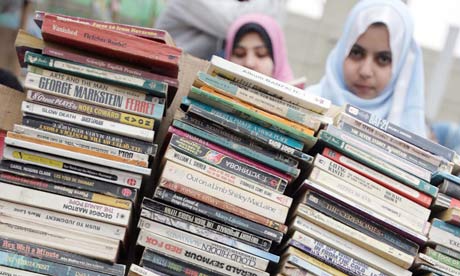
In Egypt, the issue of media censorship has leapt to center stage. Since last June, legal complaints have been filed against two dozen journalists, comedians, on-air psychologists, and TV presenters for “insulting the president.” According to the Arab Network for Human Rights Information, these cases, which can bring a three-year prison sentence, have reached a 112-year high. Newspapers attacking the Muslim Brotherhood have been seized. Individual articles have been censored.
Free expression is being squeezed in other ways, too: Hani Shukrallah, the strong-minded editor of Ahram Online, is reportedly being pushed into early retirement. Late last year, organizers at El-Sawy Culture Wheel attempted to remove images of President Morsi and Islamists from a caricature exhibition. And EgyptAir announced last month that they were reviewing the morals of in-flight movies following a Muslim Brotherhood leader’s complaint.
In an interview earlier this year, veteran journalist and novelist Ibrahim Eissa said that, “Before it used to be a fight against political oppression. Now it will be political and religious oppression. The literary text will have to face this.”
Yet, as of this moment, the book publishing industry has not had to face any new restrictions.
Books have long been printed in Egypt without direct oversight from the Censor’s office. Some printing shops, and print-shop employees, have created their own strict rules about sexual and religious content, but these can usually be overturned with a small bribe. Occasionally, once a book hits shelves, legal cases are brought against its author and publisher, and both can be fined or jailed.
But it is only imported books that must go through the Egyptian Censor’s office. These must be individually checked, and are sometimes modified or rejected. As the new AUC Press Director Dr. Nigel Fletcher-Jones noted, “That’s another reason for going digital of course, because once the traffic is not physical anymore, things become somewhat easier.”
But the Censor’s office, for the time being, does not seem to have gotten any tougher. Several publishers have said that they have noticed no increase in book censorship, apart from self-censorship.
Sherif Bakr, of Al Arabi Publishing and Distribution, even noted positive signs. Copies of Ibrahim Farghali’s 2009 novel, Sons of Gebelawi, were confiscated by censors in the spring of 2011 while coming back from a book fair abroad. Yet this year, it has won the prestigious Sawiris Award. Magdy al-Shafee’s graphic novel Metro, which was banned in 2008, has now been republished and is on sale in Cairo.
“Personally what I noticed walking through the [Cairo International Book] Fair,” Bakr said, “is that some publishers are publishing books with more sex and political views to challenge the system and to prove [that they can], or provoke the Islamic movement, challenging them to take any action against them.”
On the other hand, Bakr said, it’s true that some publishers are avoiding books that might put them in bad stead with the ruling party.
Bakr gave an example of a recently released title, Lost Revolution: Struggle between the Helmet and the Beard, by former Al Ahram editor Abdel Azim Hammad. Bakr said it was rejected by several publishers, who were afraid that publishing the book might affect their business. The book was finally published by Markaz al-Mahrousa.
Bakr added that, while he has not seen any meddling from official censors, publishers can be pressured financially. Government institutions, such as the ministry of education or public libraries, can refuse to buy from certain publishers. This, he added, “affects us very much.”
There are other forms of fear-based censorship: religious groups have, in the past, vandalized printing companies and publishing houses. They have also filed lawsuits and organized protests against the teaching of particular books, such as Mohammad Choukri’s For Bread Alone. But, in the last two years, books have not been at the center of cultural clashes.
Karam Youssef, who runs a bookstore in New Maadi and the small publishing house Kotob Khan Books, said that, in the last two years, she has not really encountered any new censorship.
However, she added, "This is not, in my opinion, because [the Brotherhood leadership] is with the cause of freedom, but it’s a matter of [not having] the time. They have a lot on their plate right now and don’t need to add cultural censorship to their schedule."
M. Lynx Qualey is a writer and reader based in Cairo, Egypt. She blogs at ArabLit.
Photo: AFP
Image: Egypt%20Books.jpg
